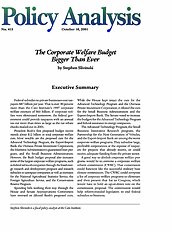Federal subsidies to private businesses cost taxpayers $87 billion per year. That is over 30 percent more than the Cato Institute’s 1997 corporate welfare estimate of $65 billion. If corporate welfare were eliminated tomorrow, the federal government could provide taxpayers with an annual tax cut more than twice as large as the tax rebate checks mailed out in 2001.
President Bush’s first proposed budget recommends about $12 billion in total corporate welfare cuts. Most notable are the proposed cuts for the Advanced Technology Program, the Export-Import Bank, the Overseas Private Investment Corporation, the Maritime Administration’s guaranteed loan program, and the Small Business Administration. However, the Bush budget proposal also increases some of the largest corporate welfare programs, such as federal aid to oil companies through the fossil energy research and development program and research subsidies to aerospace companies as well as increases for the National Agricultural Statistics Service, the Foreign Agriculture Service, and the Conservation Reserve Program.
Spending bills working their way through the House and Senate Appropriations Committees have reversed or diluted Bush’s proposed cuts. While the House kept intact the cuts for the Advanced Technology Program and the Overseas Private Investment Corporation, it diluted the cuts for the Small Business Administration and the Export-Import Bank. The Senate voted to increase the budgets for the Advanced Technology Program and federal assistance to energy companies.
The Advanced Technology Program, the Small Business Innovative Research program, the Partnership for the Next Generation of Vehicles, and the Export-Import Bank are among the worst corporate welfare programs. They subsidize large, profitable corporations at the expense of taxpayers for projects that already receive, or could receive, adequate funding from the private sector.
A good way to abolish corporate welfare programs would be to convene a corporate welfare reform commission (CWRC). That commission could function like the successful military base closure commission. The CWRC could compose a list of corporate welfare programs to eliminate and then present that list to Congress, which would have to hold an up-or-down vote on the commission proposal. The commission would help reform-minded legislators to end federal subsidies to business.

This work is licensed under a Creative Commons Attribution-NonCommercial-ShareAlike 4.0 International License.

